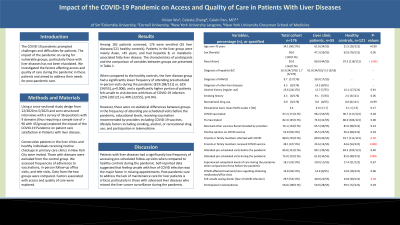Monday Poster Session
Category: Liver
P2374 - Impact of the COVID-19 Pandemic on Access and Quality of Care in Patients With Liver Diseases
Monday, October 23, 2023
10:30 AM - 4:15 PM PT
Location: Exhibit Hall

Has Audio
- CP
Calvin Pan, MD, FACG
New York University Langone Health, NYU Grossman School of Medicine
Flushing, New York
Presenting Author(s)
Vivian Wu, 1, Celeste K. Zhang, 2, Calvin Pan, MD, FACG3
1Columbia University, New York, NY; 2Cornell University, Williston Park, NY; 3New York University Langone Health, NYU Grossman School of Medicine, Flushing, NY
Introduction: The COVID-19 pandemic prompted challenges and difficulties for patients. The impact of the pandemic on caring for vulnerable groups, particularly those with liver diseases has not been elucidated. We investigated the factors affecting access and quality of care during the pandemic in these patients and aimed to address their needs for post-pandemic care.
Methods: We conducted a cross-sectional study from 12/2020 to 5/2023, using semi-structured interviews with a survey of 36 questions in 9 domains (sample size required > 90 with 45/group). Consecutive patients in the liver clinics and healthy individuals receiving routine checkups in primary care clinics in New York City were invited. Those with diseases were excluded from the control group. We assessed frequencies of adherence to vaccinations, in-person follow-up office visits, and tele-visits. Data from the two groups were compared. Factors associated with access and quality of care were explored.
Results: Among 182 patients screened, 176 were enrolled (55 liver diseases/121 healthy controls). Patients in the liver group were mainly Asian, >45 years, and had hepatitis B, or metabolic-associated fatty liver disease. The characteristics of participants and the comparison of variables between groups are presented in Table 1. When compared to the healthy controls, the liver disease group had a significantly lower frequency of attending prescheduled in-person visits during the pandemic (81% [98/121] vs. 62% [34/55], p=0.006); and a significantly higher portion of patients felt unsafe to visit doctors with fears of COVID-19 infection (25% [30/121] vs 40% [22/55], p=0.04). However, there were no statistical differences between groups in the frequency of attending pre-scheduled visits before the pandemic, educational levels, receiving vaccination recommended by providers including COVID-19 vaccines, lifestyle factors including smoking, alcohol, or recreational drug use, and participation in telemedicine.
Discussion: Patients with liver diseases had a significantly low frequency of accessing pre-scheduled follow-up visits when compared to healthy controls during the pandemic. Self-reported data suggested that feeling unsafe with fear of COVID infection was the major factor in missing appointments. Post-pandemic care to address the lack of maintenance care for liver patients is critical, particularly in those with advanced liver diseases who missed the liver cancer surveillance during the pandemic.
Disclosures:
Vivian Wu, 1, Celeste K. Zhang, 2, Calvin Pan, MD, FACG3. P2374 - Impact of the COVID-19 Pandemic on Access and Quality of Care in Patients With Liver Diseases, ACG 2023 Annual Scientific Meeting Abstracts. Vancouver, BC, Canada: American College of Gastroenterology.
1Columbia University, New York, NY; 2Cornell University, Williston Park, NY; 3New York University Langone Health, NYU Grossman School of Medicine, Flushing, NY
Introduction: The COVID-19 pandemic prompted challenges and difficulties for patients. The impact of the pandemic on caring for vulnerable groups, particularly those with liver diseases has not been elucidated. We investigated the factors affecting access and quality of care during the pandemic in these patients and aimed to address their needs for post-pandemic care.
Methods: We conducted a cross-sectional study from 12/2020 to 5/2023, using semi-structured interviews with a survey of 36 questions in 9 domains (sample size required > 90 with 45/group). Consecutive patients in the liver clinics and healthy individuals receiving routine checkups in primary care clinics in New York City were invited. Those with diseases were excluded from the control group. We assessed frequencies of adherence to vaccinations, in-person follow-up office visits, and tele-visits. Data from the two groups were compared. Factors associated with access and quality of care were explored.
Results: Among 182 patients screened, 176 were enrolled (55 liver diseases/121 healthy controls). Patients in the liver group were mainly Asian, >45 years, and had hepatitis B, or metabolic-associated fatty liver disease. The characteristics of participants and the comparison of variables between groups are presented in Table 1. When compared to the healthy controls, the liver disease group had a significantly lower frequency of attending prescheduled in-person visits during the pandemic (81% [98/121] vs. 62% [34/55], p=0.006); and a significantly higher portion of patients felt unsafe to visit doctors with fears of COVID-19 infection (25% [30/121] vs 40% [22/55], p=0.04). However, there were no statistical differences between groups in the frequency of attending pre-scheduled visits before the pandemic, educational levels, receiving vaccination recommended by providers including COVID-19 vaccines, lifestyle factors including smoking, alcohol, or recreational drug use, and participation in telemedicine.
Discussion: Patients with liver diseases had a significantly low frequency of accessing pre-scheduled follow-up visits when compared to healthy controls during the pandemic. Self-reported data suggested that feeling unsafe with fear of COVID infection was the major factor in missing appointments. Post-pandemic care to address the lack of maintenance care for liver patients is critical, particularly in those with advanced liver diseases who missed the liver cancer surveillance during the pandemic.
Disclosures:
Vivian Wu indicated no relevant financial relationships.
Celeste Zhang indicated no relevant financial relationships.
Calvin Pan: Gilead Science – Grant/Research Support.
Vivian Wu, 1, Celeste K. Zhang, 2, Calvin Pan, MD, FACG3. P2374 - Impact of the COVID-19 Pandemic on Access and Quality of Care in Patients With Liver Diseases, ACG 2023 Annual Scientific Meeting Abstracts. Vancouver, BC, Canada: American College of Gastroenterology.
